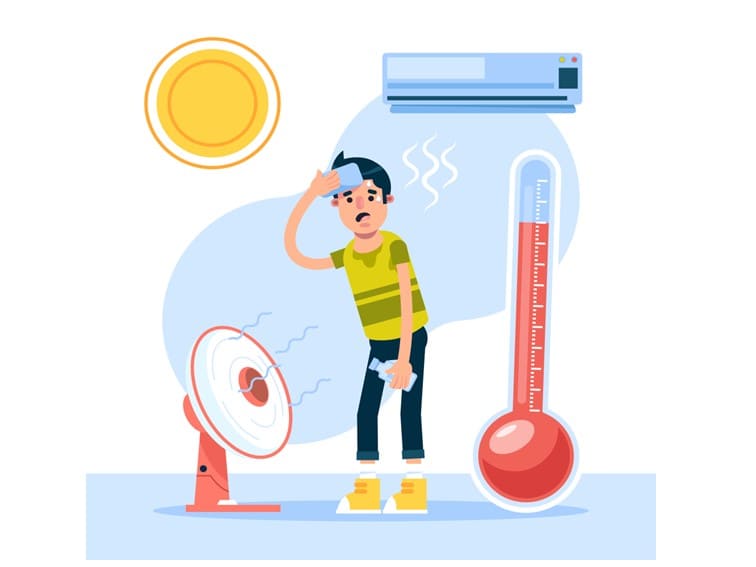Summer heat and kidney disease
Most heat illnesses occur during summer and in humid environments. When the body temperature rises up to 104 degrees Fahrenheit and humidity is above 70%, heat stroke occurs. An individual’s ability to dissipate heat becomes less effective because both temperature and humidity are high.
Heat illness can be life-threatening – it can lead to low blood pressure, loss of sweating, fast pulse, kidney failure, and heart failure. It can also lead to confusion and coma.
What happens during excess heat exposure?
Excess heat can lead to hyperthermia, dehydration, electrolyte imbalance, heat stroke, and acute renal failure.
Fluid loss happens due to increased sweating; the body also loses important salts (electrolytes); excess heat widens the blood vessels leading to a drop in blood pressure. The heart no longer pumps enough blood to the body and kidneys. When a person becomes extremely dehydrated and the fluid loss is not compensated, then heat stroke can lead to kidney failure.
Very young and very old people are the most vulnerable to heat illness. They neither notice nor realize that they are under heat effect. Family members should pay attention to the changes they notice when the temperature soars in summer.
Young infants are prone to heat effects because they can absorb heat from the environment more readily. They should not be left unattended in any warm room or a car without proper cooling as their body temperature can rise quickly.
Teenage children who play during summer are also at risk.
What Happens to the Kidneys When Someone Has Heat Illness?
Excess heat and kidney disease: Excess heat can lead to severe problems including severe dehydration, low blood pressure, and decreased kidney function. Several metabolic systems slow down and impact kidney function. A severe heat stroke can lead to severe dehydration, breakdown of muscles, shock, and heart failure – which in turn may lead to kidney failure.
Precautions
During the episodes of heat stroke, it is better not to use non-steroidal anti-inflammatory drugs (NSAIDs) as they can lead to acute kidney failure.
If you know someone with these risk factors for heat illness, you must take special precautions
People who are at risk of heat stroke should take special precautions.
Don’t sit in a closed room or a closed automobile or expose yourself to a heated environment during summer or hot sunny days.
Never leave infants, children, or pets in closed automobiles in heated environments even if it is for a few minutes.
Don’t let elderly people alone and ensure cooling measures.
Avoid the use of alcohol and other diuretics.
Avoid the midday heat and physical activity during summer.
If you feel and experience the symptoms of heat stroke then use ice to stay cool, drink plenty of liquids, and keep yourself well-hydrated.
Owing to safety, security, and privacy reasons, elderly people prefer to remain isolated in closed heated environments. This will pose a huge risk for heat illness.
Thirst is a good indicator that your body needs fluids. Young people can rely on their sense of thirst. However, with age, the sense of thirst diminishes. The best way to check dehydration is the color of the urine, the brighter the better; darker urine signals dehydration.
What should you do if you suspect heat illness?
If you see someone warm, breathing rapidly with a fast pulse, in a confused or delirious state, you must shift that person immediately to a cooler environment.
Call emergency services to transport the person to an emergency facility.
Do not offer any liquids to persons who are poorly responsive or unconscious.
Remove tight clothing and apply cool compresses to the head and neck.
In the most extreme environments, ice baths can be used. But it is always better to take such cases to emergency rooms.

Leave a Reply